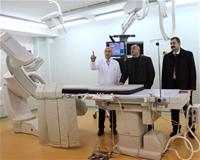Personal healthcare payment stays 8%, public servants will pay their share
Ralitsa Kovacheva, March 15, 2010
 Only 5 (five) days after the government decided to raise the obligatory personal healthcare payments from 8 to 10%, it changed its mind. The last (or not?) decision was “a result of an analysis, made by the Finance Ministry and given to the prime minister", the ministry’s press office announced. Presumably, this means the previous decision was made without any analysis. Because only a day after the increase of healthcare payment percentage, the finance minister Simeon Dyankov appeared to have prepared a Plan B:
Only 5 (five) days after the government decided to raise the obligatory personal healthcare payments from 8 to 10%, it changed its mind. The last (or not?) decision was “a result of an analysis, made by the Finance Ministry and given to the prime minister", the ministry’s press office announced. Presumably, this means the previous decision was made without any analysis. Because only a day after the increase of healthcare payment percentage, the finance minister Simeon Dyankov appeared to have prepared a Plan B:
“An option to raise the funding for healthcare is the employed in state administration to pay their contributions”, Dyankov said, referring to the privilege of state officials not to pay their share in healthcare contributions. The proposal is going to be discussed at a cabinet meeting this week as well as with the social partners next week.
„Everyone must be equal before the law", minister Dyankov explained his proposal. 150,000 public servants will be affected by the change, including state administration, judiciary, police and army. Until now the state was paying the whole amount of their health and social security payments. The Finance ministry is looking for additional stimuli for the policemen, who threatened with protests if they were deprived of this privilege. It is expected that such a change could save the budget some 150 mn levs (76 mn euro).
"Additional resources for both health and for every other sector can be ensured only after improving the quality of service", the finance minister pointed out. His words sound like an answer to the growing criticism against the government, that it has abandoned promised reforms and, instead, increased the payments in unreformed sectors. In this context, it is a good news, that finally on Wednesday a premature analysis of medical services prices will be presented. The lack of concrete pricing of healthcare services was one of the major problems in the last few years. However, no solution has been found yet.
Paradoxically, the quick change in the government’s position about healthcare payments appeared not as a manifestation of inconsistency, but quite the opposite::
"The decision of canceling the increase of healthcare contributions, together with the reduction of social security payments in the beginning of the mandate, shows government’s long term policy to hold on to fiscal discipline and keeping the budgetary deficit low. This will ensure good economic growth after the crisis", vice premier Dyankov commented.